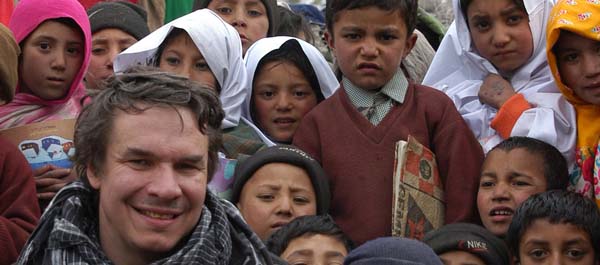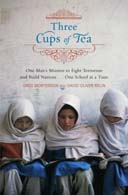One Person Can Make A Difference: Greg Mortenson

Great leadership comes in many forms. History has recorded countless examples of leadership on the battlefield by those who have risen above and beyond the call of duty to achieve extraordinary feats. However, great leadership is not limited to those in uniform. It comes in a great many forms: the stranger who saves the life of another, the community activist who helps to aid his or her community by selfless acts. The list is endless, and their deeds remarkable.
Recently I’ve read two accounts of a great humanitarian that not everyone may have heard of. His name is Greg Mortenson and in the last two decades he has done more to help educate children in two of the world’s poorest and most inaccessible places than anyone in modern history. Greg Mortenson builds schools; not just any schools but schools for the needy children of Pakistan and Afghanistan. He has been doing this quietly and without fanfare since the early 1990s and what this lone individual has accomplished is nothing less than astounding.
{default}Greg Mortenson was a one-time mountaineer whose life changed forever in early 1993 when he mistakenly trekked down the wrong side of a raging river in the Karakoram Mountains of Pakistan after a failed attempt to climb K2, the world’s second highest peak. In very rough shape, he literally stumbled into Korphe, a tiny impoverished and remote village in the Karakorams that had never before seen an American. He was taken in by the village chief, a kindly, illiterate man named Haji Ali who not only opened his home to a complete stranger for seven weeks but also helped nurse him back to health and became his mentor. Struck by how the children of this remote village attempted to gain an education in an outdoor classroom that had only an occasional itinerant teacher, Mortenson vowed to return and build a school for the children of Korphe.
Returning to California with virtually no money or real knowledge how to raise funds or actually build a school, and living occasionally homeless in his car to conserve what little money he possessed, Mortenson eventually gained the attention of a wealthy benefactor and Silicon Valley transistor pioneer named Dr. Jean Heorni whose donation enabled him to build his first school in Korphe. It was a titanic struggle to accomplish but somehow the inexperienced Mortenson used his great skills with language and persuasion to gain the trust of a great many people through employing the principles espoused in the meaning of three cups of tea, first explained to him by Haji Ali: “first time you share tea with a Balti, you are a stranger. The second time, you are an honored guest. The third time you become family."
Although his first effort was a school for both boys and girls, Mortenson soon came to see how girls in the world of Islam were second-class citizens with few opportunities for education in a male dominated world. His success in building the first ever school in Korphe led to requests from dozens of other villages to help them build schools. What Mortenson found in both Pakistan and Afghanistan was a thirst for education unlike anything he had ever seen anywhere.
During his first decade of work Mortenson built fifty-five schools in some of the most remote and forbidding places on earth: villages high in mountains accessible only on foot or horseback, in valleys and places that had never been given any government help or acknowledgment that they even existed or that they were actually not in China or .
Functioning under the very noses of the Taliban, Mortenson has now built 131 schools, most of them in Afghanistan. His work in this war-torn land is one of the few positives to emerge from what is now nearly ten years of a largely failed American war. What is so remarkable is that Mortenson has built these schools without accepting so much as a single penny of U.S. government money. To do so, Mortenson believes, would be to compromise his mission.
Eventually the U.S. military learned of Mortenson’s work and began to consult him as a valuable resource in the war against the Taliban. What this gentle man of peace preached to no less than the chairmen of the Joint Chiefs of Staff, Admiral Mike Mullen, and many other senior military men was that building schools and educating young women was one of the keys to eventual success in Afghanistan. His efforts have also drawn the attention of Gen. David Petraeus and the former ISAF/U.S. commander in Afghanistan, Gen. Stanley McChrystal.
When he briefed Admiral Mullen at the Pentagon, Mortenson said: “I told him that I thought building relationships was just as important as building projects, and that in my view, Americans have far more to learn from the people of Afghanistan than we could ever hope to teach them. Most importantly, I told him that at the height of the Taliban’s power in 2000 less than eight hundred thousand children were enrolled in school in Afghanistan – all of them boys. Today, however, student enrollment across the country was approaching 8 million children, 2.4 million of whom are girls.” (Large print edition, Stones into Schools, p. 482).
From CENTCOM to the Pentagon, to the Special Operations Command, the headquarters of the Marine Expeditionary Force at Camp Pendleton, to West Point and Annapolis, Greg Mortenson has become a familiar figure to the U.S. military. His books have become required reading for those serving in Special Forces and counter-insurgency units and are widely read by others throughout the various armed services.
When he is not in Afghanistan or Pakistan, Mortenson relentlessly lectures all over the United States to groups that number from dozens to thousands in order to raise money for his foundation based in Bozeman, Montana called the Central Asia Institute. His schedule is one that would punish the hardiest of men. During 2008, for example, he made 169 appearances in 114 cities, his schedule so crushing that he would occasionally “crash” from sheer exhaustion and panic attacks, sometimes hardly knowing where he was at the time. Each of his presentations is always followed by a book signing that can last for a much as five hours with as many as one thousand people waiting patiently in line to meet him.
Since the publication of his first book, Three Cups of Tea, in 2006 the book has sold some four million copies in forty-one countries and been at or near the top of the bestseller lists.
In reviewing Three Cups of Tea, The Bloomsbury Press may have said it best of Mortenson: “In an age when every politician and talking head has little but rhetoric to offer for the seemingly irreconcilable mess of warfare and cultural conflicts awash in the Middle East and Islamic territories in Central Asia, Mortenson’s book is a stunningly simple story of how make peace in one of the most beautiful places in the world: build schools for girls … Mortenson’s mission is a relentlessly positive one, and his ability to reveal the beauty and refuse to accept the brutal reality around him is an inspiring, heroic, and at times even crazy pursuit.”
Writing in the New York Times, columnist William D. Kristof has observed that: “Military force is essential in Afghanistan to combat the Taliban. But over time, in Pakistan and Afghanistan alike, the best tonic against militant fundamentalism will be education and economic opportunity. So a lone Montanan staying at the cheapest guest houses has done more to advance U.S. interests in the region than the entire military and foreign policy apparatus of the Bush administration.” (“It Takes a School, Not Missiles,” NY Times, July 13, 2008).
And recently this appeared in the NY Times: “In the frantic last hours of Gen. Stanley A. McChrystal’s command in Afghanistan, when the world wondered what was racing through the general’s mind, he reached out to an unlikely corner of his life: the author of the book “Three Cups of Tea,’ Greg Mortenson. ‘Will move through this and if I’m not involved in the years ahead, will take tremendous comfort in knowing people like you are helping Afghans build a future,’ General McChrystal wrote to Mr. Mortenson in an e-mail message, as he traveled from Kabul to Washington. The note landed in Mr. Mortenson’s inbox shortly after 1 a.m. Eastern time on June 23. Nine hours later, the general walked into the Oval Office to be fired by President Obama. (July 17, 2010)
The Presidential Medal of Freedom is all too frequently awarded to undeserving public figures, often as a talisman for failure instead of great achievement. Greg Mortenson should have long since been accorded this honor. The good this great humanitarian has done for both America and the world is immeasurable. In my opinion Mortenson not only should be so honored by the President but he should be awarded the Nobel Peace Prize for his selfless contributions to world peace. He was nominated both in 2009 and 2010 and is believed to have been a finalist. I sincerely hope that the Nobel Committee will eventually do the right thing and make it happen.
If you haven’t read either of his books you are missing two of the most important and feel-good stories of the new century.
 Three Cups of Tea
Three Cups of Tea
One Man’s Mission to Promote Peace … One School at a Time
by Greg Mortenson, David O. Relin
Viking Penguin hardcover: Mar 2006, 352 pages
Penguin paperback: Jan 2007. $16.00
Note: Greg Mortenson fought with his publisher to change the original title from “man’s mission to fight terrorism and build nations” to the one shown above. The hardback edition and some of the paperbacks used this sub-title before Mr. Mortenson was able to persuade Penguin to change it.
 Stones Into Schools
Stones Into Schools
Promoting Peace With Books, Not Bombs, in Afghanistan and Pakistan
By Greg Mortenson
420 pages. Viking. $26.95. Large print edition 605 pages

